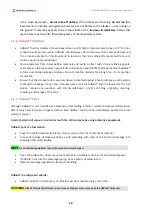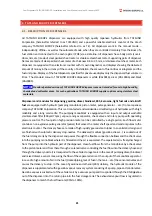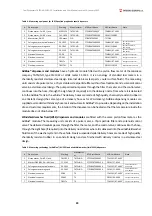
TATSUNO
EUROPE
a.s.,
www.tatsuno
‐
europe.com
14
Natural
gas
is
not
dangerous
for
human
health.
It
has
no
toxic
or
poisonous
effects.
In
high
concentrations
it
may
cause
suffocation
because
it
reduces
the
amount
of
oxygen
in
inhaled
air.
When
natural
gas
is
accumulated
in
a
closed
room
or
in
an
open
space
under
windless
conditions
an
explosive
mixture
may
be
formed
(within
the
range
of
4.4
÷
17
vol.
%)
and
an
explosion
may
occur
after
initiation
(by
open
flame,
spark,
electric
discharge).
In
rapid
expansion
from
the
higher
pressure
above
approx.
15
bar
cooling
occurs
and
water
vapour
in
the
vicinity
of
the
discharge
opening
may
freeze
–
frostbite
hazard.
Condensate
is
flammable
and
saturated
with
methane
at
the
moment
of
discharge.
The
recommended
extinguishing
agent
is
a
dry
‐
powder
extinguisher.
1.4.
HEALTH
AND
SAFETY
1.4.1.
LIST
OF
SAFETY
FACTORS
Any
odour
of
gasoline,
LPG,
CNG
or
ammonia
(AdBlue®)
must
be
immediately
reported.
It
is
necessary
that
all
work
at
the
fuel
station,
especially
construction
and
repairs,
is
performed
fill
yin
compliance
with
this
list.
It
is
the
obligation
of
the
constructor
that
all
his
employees
comply
with
all
laws,
directives,
and
other
regulations.
All
liquid
fuels
(gasoline,
diesel,
LPG,
E85),
technical
liquids
(WSE
and
AdBlue®)
and
gas
(CNG)
may
only
be
stored
in
tanks
and
containers
compatible
with
these
liquids
and
gases.
Locations
requiring
higher
carefulness
The
interior
of
a
tank,
pipes,
shafts
of
storage
tanks,
filling
shafts,
relief
shafts,
containers,
and
dispensers.
All
locations
where
accumulation
of
fuel,
LPG
and
AdBlue®
vapours
may
occur
and
when
these
vapours
are
heavier
than
air,
such
as
in
drainage
shafts,
low
‐
lying
rooms,
cellars,
trenches,
etc.
The
surroundings
of
tank
ventilation,
especially
during
filling.
Any
locations
nearby
deliveries,
truck
tanks
and
other
vehicles
during
deliveries,
especially
in
windless
conditions.
A
radius
of
1
m
around
the
pipes
transporting
gasoline
or
containing
gasoline
vapours.
The
filters.
1.4.2.
OBLIGATIONS
OF
EMPLOYEES
To
ensure
optimum
prevention
of
injuries,
in
addition
to
general
rules
for
employee
protection
it
is
necessary
to
consider
also
national
legislation
about
employee
protection
and
actively
support
all
measures
improving
safety
standards.
An
employee
is
obliged
to
observe
all
company
guidelines
about
accident
prevention
except
for
the
cases
when
these
guidelines
are
assessed
as
illegitimate.
Employees
must
not
act
according
to
any
instruction
that
violate
safety
rules.
Employees
may
use
designed
tools
only
for
their
original
purposes
that
are
defined
by
the
company
itself.





























